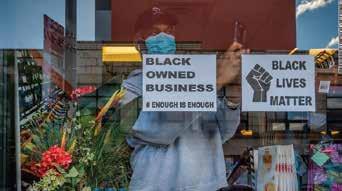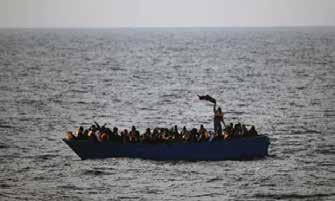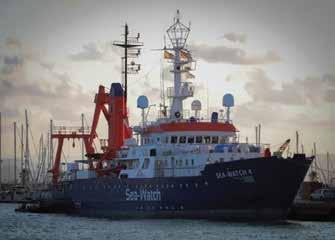
14 minute read
Humanity Wins
the COVID-19 pandemic on 19 July. The Jamaican Prime Minister, the Most Hon. Andrew Holness, and Leader of the Opposition, Dr Peter Phillips, delivered messages of appreciation.
Among medical personnel attending were pharmacists, lab technicians, ambulance drivers, porters, doctors and nurses, as well as sanitation workers, the police and security agents, many of whom were in uniform. Lauded as “Healers of the Nation”, Rev Astor Carlyle, Minister of the Webster Charge, paid tribute to their “indomitable, courageous and compassionate spirit” in rendering their services. In his sermon themed “Jesus, Healer of Broken Bodies” and based on Mark 2:1-12, Rev Carlyle likened their country Jamaica to the paralysed man, and their nation’s frontline workers to the man’s companions bringing vital resources to save the nation. He also challenged the congregation to the compassionate cooperation and companionship that had been exhibited, to “honourably serve with ears attentive to the cries of their sisters and brothers”, and for their actions to speak louder than their words to care for persons.
GCU youth supporting families
The Ubuntu Young People Organisation (UYPO) supports families in crisis through a Food Hamper Distribution Project. UYPO, is a Non-Governmental Organisation (NGO) operated by young people in Guyana some of whom are members of the Guyana Congregational Union (GCU). Founder and former Training in Mission participant Ominell Boyce noted, “We have the distribution done annually, so we select families that are nding it di cult to give children the proper nourishment they need.” According to Ominell, to select the families, UYPO works in partnership with organisations within the community including the community policing group, teachers as well as counsellors who work with the neighbourhood and the Democratic Council, an organ of local government.
The project was initiated after the young people observed that even though there were feeding programmes within the schools, there weren’t nutritious meals prepared for the children when they got home. UYPO’s goal is to progress to a monthly distribution. The organisation has received feedback that the hampers (mainly groceries) have been a signi cant help to the families that have bene tted. 18 families have bene tted so far this year and were also encouraged to start a kitchen garden in order to sustain their households.
Indigenous trackers o er lessons on wildlife
The San are an indigenous people living across South Africa, Botswana, and Namibia, who have been passing down expertise on their land and fauna from generation to generation for thousands of years. Louis Liebenberg, an associate of human evolutionary biology at Harvard University, has developed free software that allows the San animal trackers in the Kalahari to share tracking insights and create better data on biodiversity.
The San people carry smartphones, using an icon-based interface to input their ndings including where they have heard and seen wildlife, as well as sightings of animal tracks and faeces, based on group consensus. Species and geolocation data are uploaded to a solar-powered laptop by trackers and sent to Liebenberg. In exchange, they are paid for their work, turning a way of life into a vocation.
Image via summarizer.co
Liebenberg, also the executive director of CyberTrackerConservation, had been connecting indigenous San groups in Namibia with scientists worldwide for over 20 years, and said that this system is quicker than text-based logging and is inclusive of illiterate people.
Since its initial roll out, the app has evolved and been downloaded more than half a million times in over 200 countries, and has been used by indigenous trackers in Australia; for land management in Canada; PhD studies on bottlenose dolphins o New Zealand; whale monitoring in Antarctica and turtle research in the Paci c. 1
Campaign to support Black businesses
The number of Black business owners fell by 41% between February and April, a far higher percentage than any other racial group, according to research from the University of California at Santa Cruz. Following George Floyd’s death, however, people turned to supporting black-owned businesses as a response to protest. The “My Black Receipt” campaign was then launched to provide a way where this collective impact was measurable, and for Americans to “put their receipts where their protest is”.
Open storefront in Brooklyn, New York, displaying a Black Owned Business sign. (CNN)

The initiative was started by Black upStart, an organisation that trains Black entrepreneurs, and aimed to motivate consumers to spend $5 million at Black-owned businesses. People are asked to upload their receipt from Black-owned businesses and turn it into more than a one-time purchase. In July, the campaign had garnered over $550,000 in total receipts, and the site also allowed Black businesses to advertise themselves on its preferred shopping list. 2
Immigrants breathe new life into museum exhibits
The Penn Museum of Archaeology and Anthropology
A person walks past a wall of portraits at the Museum of the American Revolution in Philadelphia, which is helping teach migrants about the country's history. (Matt Rourke / AP)

in Philadelphia found a meaningful way to broaden its docent pool and re ect its vibrant, diverse collection. The museum's Ellen Owens and Kevin Schott used a grant to create “Global Guides”, a new program at the University of Pennsylvania-a liated museum to make its exhibits come alive.
On a part time basis, immigrants take visitors on scheduled tours, speaking speci cally about artifacts from their home regions, putting them in cultural context from personal experience. The fact that the Global Guides can relate artifacts from thousands of years ago to their rst-hand experiences and upbringings sets visitors’ experiences apart from that of other museums, Schott believes. To date, this has ranged from royal Sumerian jewellery to ancient African objects. 3
German Church sends migrant rescue boat to central Mediterranean
United4Rescue, an initiative led by the Protestant Church in Germany (EKD) and backed by more than 500 other organisations launched a crowdfunding campaign named #WirSchickenEinSchi (“We send a ship”) a few months ago. This enabled the purchase of Sea-Watch 4, a boat sent from the seaport of Burriana in Spain to the central Mediterranean to rescue migrants attempting to reach Europe from North Africa. The church’s mission had already been announced in February, after a ceremony in the northern port city of Kiel, which was attended by politicians, volunteers and church leaders.
Sea-Watch 4 is a ‘strong political statement’ against Europe’s migration politics, a spokesperson said. Photograph: Emilio Morenatti/AP

The ship was due to sail from Spain in April, but preparations were stalled due to the pandemic. “This ship has to be out there, because European states do not intend, nor do they manage, to rescue people in the Mediterranean,” said the head of EKD, Heinrich Bedford-Strohm, during the ceremony. 4
The Sea-Watch 4 in the port of Burriana, Spain, as it prepares to embark on its first lifesaving mission to the central Mediterranean sea. Photograph: Hannah Wallace Bowman/MS

1 https://edition.cnn.com/2020/07/09/africa/louis-liebenberg-c2e-spcint/index.html? 2 https://edition.cnn.com/2020/06/24/business/my-black-receipt-busi nesses-yelp-trnd/index.html 3 https://edition.cnn.com/travel/article/global-guides-penn-museum-tr nd/index.html 4 https://www.theguardian.com/world/2020/aug/06/german-protestan t-church-to-send-migrant-rescue-boat-to-mediterranean
500 million Christians urge G20 to fix broken economic architecture

Image via wcrc.ch
Council for World Mission (CWM) joined its ecumenical partners to address G20 leaders in an urgent letter on 13 July, just ahead of the G20 Finance Ministers and Central Governors Meeting. The four global organisations, representing 500 million Christians, implored the G20 to leave behind a broken financial system and work towards a truly just and sustainable recovery.:
13 July 2020
The Finance Ministers and Central Bank Governors of the Group of 20 (G20)
Your Excellencies:
Our organisations, the World Council of Churches (WCC), World Communion of Reformed Churches (WCRC), Lutheran World Federation (LWF) and Council for World Mission (CWM), have followed with profound concern how the COVID-19 pandemic and the related economic crisis have continued to destroy lives and livelihood around the world. To date this has resulted in more than half a million deaths, massive unemployment, increase of debts, poverty, and inequality in many parts of the world.
We want to express our appreciation for the G20’s prompt efforts to address the crises by offering fiscal measures to support public health response, temporary debt relief for the poorest countries, and emergency financing facilities as agreed at your last meeting on 15 April 2020. We also welcome the G20’s recognition of the necessity for governments to work together in a coordinated and coherent manner. At the same time, we think that more can and ought to be done to mitigate human suffering and promote a truly just and sustainable recovery.
As you are well aware, the spread of the COVID-19 pandemic has demonstrated how many countries are ill-equipped and poorly resourced to respond to an emergency of this scale and magnitude. It has exposed the deeper crisis which is a result of the current economic and development model, namely the exploitation of resources in a manner that destroys the planet and leaves the majority of people in poverty.
This moment offers us an unprecedented opening to collectively examine the current order and to ‘build back better’ a different system that nurtures the health, wellbeing and resilience of communities and the planet for generations to come. Here we would like to underline that COVID-19 recovery measures and policies must be compatible with urgent and ambitious action to address the climate crisis.
We believe that it is feasible today to embark on essential transformation in global and national development and economic policies and practices because the majority of people do not want to go back to the ‘old normal.’ For these changes to be viable and sustainable, discussions must also take place under the aegis of the United Nations (UN) where there is broad participation of countries and civil society. Multilateralism must remain as a key principle and approach for addressing global challenges.
In light of the foregoing, permit us to share, on behalf of the churches, some proposals for the G20 to take into consideration at the upcoming meetings of the finance ministers and central bank governors and at the Leaders’ Summit in November 2020:
Allocate adequate financial resources to the public health and social protection of the hundreds of millions of people whose livelihoods have been decimated by the pandemic and the related
response measures. This includes ensuring widespread testing, provision of protective and other equipment for healthcare, essential workers and hospitals; healthcare coverage for all, including the most vulnerable; the search for an effective, accessible, and affordable vaccine or cure; basic income grants, unemployment assistance, and wage subsidy schemes; as well as support for small businesses, and availing finance to support the COVID-19 related and other humanitarian needs.
Cancel the external debts of low- and middle-income countries (which were at damaging levels even before the pandemic) to free up resources for governments to respond effectively to the COVID-19 pandemic and to build the resilience and livelihoods of people and communities.
Implement global tax reform to fund the recovery. This would include: the initiation of a progressive wealth tax, financial transaction tax and carbon tax at national and global levels; the reintroduction of capital gains and inheritance taxes; measures to curb tax evasion and avoidance; and reparations for slavery and other social and ecological debts. Furthermore, a COVID-19 surcharge must be levied on the super-wealthy, equity and hedge funds, and multinational, e-commerce and digital corporations that are reaping even greater returns from the current crisis to resource the critical response to the pandemic.
Safeguard public goods and the ecological commons; guarantee living wages for all; and privilege such life-affirming areas as health, education, water and sanitation, agro-ecology, and renewable energy in both COVID-19 recovery and longer-term plans.
Our organisations collectively represent more than 500 million Christians worldwide. We hope that you will take our proposals into account in your deliberations and would appreciate a response to this letter.
We pray that you have constructive and transformative meetings.
Yours sincerely,
Prof Rev Dr Ioan Sauca Acting General Secretary, WCC
Rev Dr Chris Ferguson General Secretary, WCRC
Rev Dr Martin Junge General Secretary, LWF
Rev Dr Collin Cowan General Secretary, CWM
Applications are open for Covid-19 Mission Initiative Fund

Council for World Mission (CWM) is inviting member churches and partner organisations to apply for support through the Covid-19 Mission Initiatives Fund. These are days of clear missional challenge, as the first wave of Covid-19 has already upended and threatened all dimensions of economies, governments, corporations, communities and families.
Simultaneously, it has exposed the interconnectedness of all people, the foolishness of supremacist ideologies and prejudice hindering our relationships, and the systemic injustices underlying and heightening this Covid-19 crisis. Vulnerable communities including migrants, people of colour, people with disabilities bear the brunt of the pandemic. They are disproportionately affected by the virus, by government policies formulated to tackle the crisis, and are targeted for populist violence.
Church communities are not spared the challenges posed by the pandemic, be it discovering how to do and be the Church without physical gatherings for corporate worship, worsened by the loss of income from the weekly offertory.
All these communities are central to CWM’s vision of mission and the commitment we have to invite life flourishing communities. Thus, CWM is looking to assist and resource mission initiatives with grants up to SG$25,000 per member church or partner organisation. We are keen to support projects working with those most affected by Covid-19 in your context or with developing innovative responses to the issues facing churches.
Project criteria: Applications can be made for work that particularly focuses on enabling mission initiatives responding to areas such as:
The impact on vulnerable groups like minority ethnic communities, migrant workers, informal workers, people now unemployed etc The need for advocacy for these vulnerable groups The heightened incidences of domestic violence under the Covid-19 lockdowns The need to support day labourers, non-union, informal and seasonal workers The need to support health, social and home care workers The challenge of being the church when buildings are closed and corporate worship and face to face work is not possible And to areas distinct to the particular impact of Covid-19 in the context of the member church or partner.
The Board of Directors is pleased to invite expressions of interest, from suitable individuals, for the position of General Secretary for Council for World Mission (CWM).

CWM seeks an inspirational, ecumenical and experienced General Secretary (Chief Executive Officer) with exceptional interpersonal and communication skills and cross-cultural agility to lead this global organisation in deepening partnership with its stakeholders and living out its vision of fullness of life, through Christ, for all creation. The General Secretary will work with the Directors and Trustees to read the signs of the times and to discern God’s mission for CWM. The GS will lead the management team to align strategy with mission and to develop and implement programme and action plans to further the mission.
Requirements
A visionary leader who understands and embodies the values of CWM; firmly grounded in and committed to God’s justice and peace Ability to demonstrate a high level of theological understanding, ideally with a post-graduate level qualification. Qualifications and skills related to management or business administration are desirable. Conversant with and confident in leading and contributing to theological discourse and solidarity action with ecumenical partners and people’s movements. Commitment to CWM’s ethos of partnership and equal representation, resource sharing, empowerment of member churches, and ecumenical cooperation. Ability to lead and motivate others and to foster productive working relationships with and among CWM member churches, Board members, member-representatives and staff colleagues. Ability to think and plan strategically and to execute, analyse and problem-solve effectively. Ability to adapt one’s leadership style to different circumstances cultures and peoples; and to manage diversity and promote equal opportunities across all areas of CWM constituency Overall accountability for staff team deliverables and embodiment of CWM’s vision, values and ethos. Excellent listening skills, approachability and trustworthiness.
Location
The role is based in Singapore. However, Johannesburg or London may be considered. Extensive global travel is required.
How to apply
Download an application pack - https://bit.ly/3kgGwWp Download Application form - https://bit.ly/3fz0iZt Download the 2020-2029 Strategy Framework for background information - https://bit.ly/33B94UE
*Deadline for applications 9 October 2020
Council for World Mission is an equal opportunities employer and is committed to diversity amongst its staff and its members, and does not discriminate in hiring or terms and conditions of employment because of an individual’s race, colour, ancestry or national origin, disability, marital status, sexuality, age or gender. Due to the nature of the work of General Secretary, and purpose and ethos of a Christian mission organisation, it is a genuine occupational requirement that the job holder be a practising Christian.
For any questions related the position of General Secretary, please write to the Consultant on gs.search@cwmission.org









